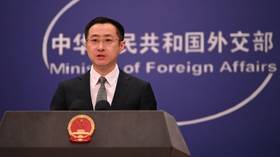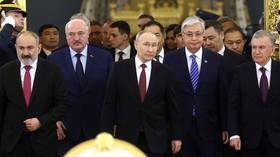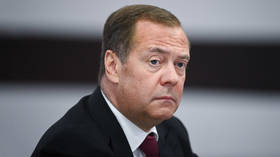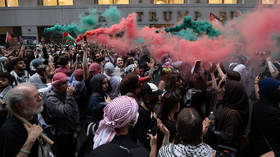Dozens detained at anti-govt protests in ex-Soviet state (VIDEOS)
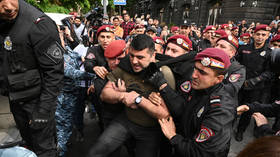
Armenian police reportedly detained at least 63 protesters in the capital Yerevan on Tuesday, as Prime Minister Nikol Pashinyan continues to face calls to resign over a border deal with neighboring Azerbaijan.
According to local media reports, protests began early in the morning when activists used garbage cans and benches to block Abovyan Street, which leads to Yerevan’s main Republic Square. Footage posted online showed dozens of officers restraining protesters and taking them away in police vans. All the detainees were later released, local media reported, citing law enforcement.
Unrest first emerged in mid-April when Yerevan and Baku agreed to launch a border delimitation process, starting with the transfer of four villages in the Tavush region to Azerbaijan.
The agreement sparked anger and led to the formation of the ‘Tavush for the Homeland’ protest movement, led by the head of the Tavush diocese of the Armenian Apostolic Church, Archbishop Bagrat Galstanyan.
So cute.....Morning in Yerevan begins with arrests✌️✌️ pic.twitter.com/I61jockVN9
— K .∀.∀ (@LVieEstBelle) May 14, 2024
Earlier this month, protesters began a march from the border region to the capital.
On May 9, activists staged a several-thousand-strong demonstration in Yerevan, where Galstanyan demanded the resignation of the prime minister. According to the archbishop, two opposition parties in the Armenian parliament are ready to begin impeachment proceedings against Pashinyan.
Protests in Yerevan have resumed in recent days. On Monday, activists blocked several streets with garbage cans, road signs, and haystacks. Local media reports claim police detained more than 150 people, but all of them were released later in the day.
Relations between Armenia and neighboring Azerbaijan have been strained since the collapse of the USSR, when the predominantly Armenian population of Azerbaijan’s Karabakh region proclaimed independence from Baku. The region existed for many years as an unrecognized republic, and has been fought over in a series of bloody conflicts between the two countries.
The latest major escalation of hostilities took place in 2023, when Azerbaijani soldiers clashed with the province’s separatist forces. The conflict ended with the dissolution of Nagorno-Karabakh’s government and the return of the province under Baku’s control.
Pashinyan has faced protests and accusations of betrayal over his handling of the conflict ever since he formally recognized Baku’s sovereignty over the region in 2023. Commenting in December, the prime minister argued that the abolition of Nagorno-Karabakh had been inevitable, and that Yerevan had been spending its resources on the republic in vain.
On May 10-11, Azerbaijan and Armenia held peace talks in Almaty brokered by Kazakhstan. According to statements issued following the discussions between the countries’ respective foreign ministers, Jeyhun Bayramov and Ararat Mirzoyan, both sides expressed readiness to continue working on a draft peace agreement between the two states.



